
Intel Core i9-13900K vs AMD Ryzen 9 7950X
Last updated:
CPU comparison with benchmarks
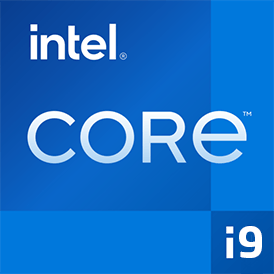
|
 |
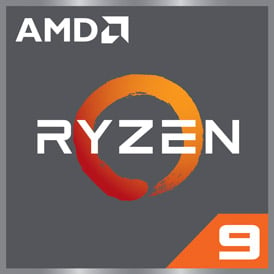
|
| Intel Core i9-13900K | AMD Ryzen 9 7950X | |
CPU comparisonIn this CPU comparison, we compare the Intel Core i9-13900K and the AMD Ryzen 9 7950X and use benchmarks to check which processor is faster.
We compare the Intel Core i9-13900K 24 core processor released in Q4/2022 with the AMD Ryzen 9 7950X which has 16 CPU cores and was introduced in Q4/2022. |
||
| Intel Core i9 (78) | Family | AMD Ryzen 9 (35) |
| Intel Core i 13000 (17) | CPU group | AMD Ryzen 7000 (14) |
| 13 | Generation | 6 |
| Raptor Lake S | Architecture | Raphael (Zen 4) |
| Desktop / Server | Segment | Desktop / Server |
| Intel Core i9-12900K | Predecessor | AMD Ryzen 9 5950X |
| Intel Core i9-14900K | Successor | -- |
|
|
||
CPU Cores and Base FrequencyThe Intel Core i9-13900K is a 24 core processor with a clock frequency of 3.00 GHz (5.80 GHz). The processor can compute 32 threads at the same time. The AMD Ryzen 9 7950X clocks with 4.50 GHz (5.70 GHz), has 16 CPU cores and can calculate 32 threads in parallel. |
||
| Intel Core i9-13900K | Characteristic | AMD Ryzen 9 7950X |
| 24 | Cores | 16 |
| 32 | Threads | 32 |
| hybrid (big.LITTLE) | Core architecture | normal |
| Yes | Hyperthreading | Yes |
| Yes | Overclocking ? | Yes |
| 3.00 GHz (5.80 GHz) 8x Raptor Cove |
A-Core | 4.50 GHz (5.70 GHz) |
| 2.20 GHz (4.30 GHz) 16x Gracemont |
B-Core | -- |
Internal GraphicsGraphics (iGPU) integrated into the processor not only enable image output without having to rely on a dedicated graphics solution, but can also efficiently accelerate video playback. |
||
| Intel UHD Graphics 770 | GPU | AMD Radeon Graphics (Raphael) |
| 0.30 GHz | GPU frequency | 0.40 GHz |
| 1.65 GHz | GPU (Turbo) | 2.20 GHz |
| 11 | GPU Generation | 9 |
| 10 nm | Technology | 5 nm |
| 3 | Max. displays | 3 |
| 32 | Compute units | 2 |
| 256 | Shader | 128 |
| No | Hardware Raytracing | No |
| No | Frame Generation | No |
| 64 GB | Max. GPU Memory | 8 GB |
| 12 | DirectX Version | 12 |
Hardware codec supportA photo or video codec that is accelerated in hardware can greatly accelerate the working speed of a processor and extend the battery life of notebooks or smartphones when playing videos. |
||
| Intel UHD Graphics 770 | GPU | AMD Radeon Graphics (Raphael) |
| Decode / Encode | Codec h265 / HEVC (8 bit) | Decode / Encode |
| Decode / Encode | Codec h265 / HEVC (10 bit) | Decode / Encode |
| Decode / Encode | Codec h264 | Decode / Encode |
| Decode / Encode | Codec VP9 | Decode / Encode |
| Decode / Encode | Codec VP8 | Decode / Encode |
| Decode | Codec AV1 | Decode |
| Decode / Encode | Codec AVC | Decode / Encode |
| Decode | Codec VC-1 | Decode |
| Decode / Encode | Codec JPEG | Decode / Encode |
Memory & PCIeUp to 192 GB of memory in a maximum of 2 memory channels is supported by the Intel Core i9-13900K, while the AMD Ryzen 9 7950X supports a maximum of 128 GB of memory with a maximum memory bandwidth of 83.2 GB/s enabled. |
||
| Intel Core i9-13900K | Characteristic | AMD Ryzen 9 7950X |
| DDR5-5600, DDR4-3200 | Memory | DDR5-5200 |
| 192 GB | Max. Memory | 128 GB |
| 2 (Dual Channel) | Memory channels | 2 (Dual Channel) |
| 89.6 GB/s | Max. Bandwidth | 83.2 GB/s |
| Yes | ECC | Yes |
| 32.00 MB | L2 Cache | 16.00 MB |
| 36.00 MB | L3 Cache | 64.00 MB |
| 5.0 | PCIe version | 5.0 |
| 20 | PCIe lanes | 24 |
| 78.8 GB/s | PCIe Bandwidth | 94.5 GB/s |
Thermal ManagementThe Intel Core i9-13900K has a TDP of 125 W. The TDP of the AMD Ryzen 9 7950X is 170 W. System integrators use the TDP of the processor as a guide when dimensioning the cooling solution. |
||
| Intel Core i9-13900K | Characteristic | AMD Ryzen 9 7950X |
| 125 W | TDP (PL1 / PBP) | 170 W |
| 253 W | TDP (PL2) | 230 W |
| -- | TDP up | -- |
| -- | TDP down | -- |
| 100 °C | Tjunction max. | 95 °C |
Technical detailsThe Intel Core i9-13900K has 68.00 MB cache and is manufactured in 10 nm. The cache of AMD Ryzen 9 7950X is at 80.00 MB. The processor is manufactured in 5 nm. |
||
| Intel Core i9-13900K | Characteristic | AMD Ryzen 9 7950X |
| 10 nm | Technology | 5 nm |
| Monolithic | Chip design | Chiplet |
| x86-64 (64 bit) | Instruction set (ISA) | x86-64 (64 bit) |
| SSE4.1, SSE4.2, AVX2, AVX2+ | ISA extensions | SSE4a, SSE4.1, SSE4.2,FMA3, AVX2, AVX512 |
| LGA 1700 | Socket | AM5 (LGA 1718) |
| VT-x, VT-x EPT, VT-d | Virtualization | AMD-V, SVM |
| Yes | AES-NI | Yes |
| Windows 10, Windows 11, Linux | Operating systems | Windows 10, Windows 11, Linux |
| Q4/2022 | Release date | Q4/2022 |
| 589 $ | Release price | 699 $ |
| show more data | show more data | |
Rate these processors
Average performance in benchmarks
⌀ Single core performance in 7 CPU benchmarks
⌀ Multi core performance in 9 CPU benchmarks
Cinebench 2024 (Single-Core)
The Cinebench 2024 benchmark is based on the Redshift rendering engine, which is also used in Maxon's 3D program Cinema 4D. The benchmark runs are each 10 minutes long to test whether the processor is limited by its heat generation.
|
|
Intel Core i9-13900K
24C 32T @ 5.80 GHz |
||
|
|
AMD Ryzen 9 7950X
16C 32T @ 5.70 GHz |
||
Cinebench 2024 (Multi-Core)
The Multi-Core test of the Cinebench 2024 benchmark uses all cpu cores to render using the Redshift rendering engine, which is also used in Maxons Cinema 4D. The benchmark run is 10 minutes long to test whether the processor is limited by its heat generation.
|
|
Intel Core i9-13900K
24C 32T @ 5.80 GHz |
||
|
|
AMD Ryzen 9 7950X
16C 32T @ 5.70 GHz |
||
Cinebench R23 (Single-Core)
Cinebench R23 is the successor of Cinebench R20 and is also based on the Cinema 4 Suite. Cinema 4 is a worldwide used software to create 3D forms. The single-core test only uses one CPU core, the amount of cores or hyperthreading ability doesn't count.
|
|
Intel Core i9-13900K
24C 32T @ 5.80 GHz |
||
|
|
AMD Ryzen 9 7950X
16C 32T @ 5.70 GHz |
||
Cinebench R23 (Multi-Core)
Cinebench R23 is the successor of Cinebench R20 and is also based on the Cinema 4 Suite. Cinema 4 is a worldwide used software to create 3D forms. The multi-core test involves all CPU cores and taks a big advantage of hyperthreading.
|
|
Intel Core i9-13900K
24C 32T @ 5.50 GHz |
||
|
|
AMD Ryzen 9 7950X
16C 32T @ 5.20 GHz |
||
Geekbench 5, 64bit (Single-Core)
Geekbench 5 is a cross plattform benchmark that heavily uses the systems memory. A fast memory will push the result a lot. The single-core test only uses one CPU core, the amount of cores or hyperthreading ability doesn't count.
|
|
Intel Core i9-13900K
24C 32T @ 5.80 GHz |
||
|
|
AMD Ryzen 9 7950X
16C 32T @ 5.70 GHz |
||
Geekbench 5, 64bit (Multi-Core)
Geekbench 5 is a cross plattform benchmark that heavily uses the systems memory. A fast memory will push the result a lot. The multi-core test involves all CPU cores and taks a big advantage of hyperthreading.
|
|
Intel Core i9-13900K
24C 32T @ 5.50 GHz |
||
|
|
AMD Ryzen 9 7950X
16C 32T @ 5.20 GHz |
||
Geekbench 6 (Single-Core)
Geekbench 6 is a benchmark for modern computers, notebooks and smartphones. What is new is an optimized utilization of newer CPU architectures, e.g. based on the big.LITTLE concept and combining CPU cores of different sizes. The single-core benchmark only evaluates the performance of the fastest CPU core, the number of CPU cores in a processor is irrelevant here.
|
|
Intel Core i9-13900K
24C 32T @ 5.80 GHz |
||
|
|
AMD Ryzen 9 7950X
16C 32T @ 5.70 GHz |
||
Geekbench 6 (Multi-Core)
Geekbench 6 is a benchmark for modern computers, notebooks and smartphones. What is new is an optimized utilization of newer CPU architectures, e.g. based on the big.LITTLE concept and combining CPU cores of different sizes. The multi-core benchmark evaluates the performance of all of the processor's CPU cores. Virtual thread improvements such as AMD SMT or Intel's Hyper-Threading have a positive impact on the benchmark result.
|
|
Intel Core i9-13900K
24C 32T @ 5.50 GHz |
||
|
|
AMD Ryzen 9 7950X
16C 32T @ 5.20 GHz |
||
Cinebench R20 (Single-Core)
Cinebench R20 is the successor of Cinebench R15 and is also based on the Cinema 4 Suite. Cinema 4 is a worldwide used software to create 3D forms. The single-core test only uses one CPU core, the amount of cores or hyperthreading ability doesn't count.
|
|
Intel Core i9-13900K
24C 32T @ 5.80 GHz |
||
|
|
AMD Ryzen 9 7950X
16C 32T @ 5.70 GHz |
||
Cinebench R20 (Multi-Core)
Cinebench R20 is the successor of Cinebench R15 and is also based on the Cinema 4 Suite. Cinema 4 is a worldwide used software to create 3D forms. The multi-core test involves all CPU cores and taks a big advantage of hyperthreading.
|
|
Intel Core i9-13900K
24C 32T @ 5.50 GHz |
||
|
|
AMD Ryzen 9 7950X
16C 32T @ 5.20 GHz |
||
iGPU - FP32 Performance (Single-precision GFLOPS)
The theoretical computing performance of the internal graphics unit of the processor with simple accuracy (32 bit) in GFLOPS. GFLOPS indicates how many billion floating point operations the iGPU can perform per second.
|
|
Intel Core i9-13900K
Intel UHD Graphics 770 @ 1.65 GHz |
||
|
|
AMD Ryzen 9 7950X
AMD Radeon Graphics (Raphael) @ 2.20 GHz |
||
Blender 3.1 Benchmark
In the Blender Benchmark 3.1, the scenes "monster", "junkshop" and "classroom" are rendered and the time required by the system is measured. In our benchmark we test the CPU and not the graphics card. Blender 3.1 was presented as a standalone version in March 2022.
|
|
Intel Core i9-13900K
24C 32T @ 5.50 GHz |
||
|
|
AMD Ryzen 9 7950X
16C 32T @ 5.20 GHz |
||
Estimated results for PassMark CPU Mark
Some of the CPUs listed below have been benchmarked by CPU-monkey. However the majority of CPUs have not been tested and the results have been estimated by a CPU-monkey’s secret proprietary formula. As such they do not accurately reflect the actual Passmark CPU mark values and are not endorsed by PassMark Software Pty Ltd.
|
|
Intel Core i9-13900K
24C 32T @ 5.50 GHz |
||
|
|
AMD Ryzen 9 7950X
16C 32T @ 5.20 GHz |
||
CPU-Z Benchmark 17 (Single-Core)
The CPU-Z benchmark measures a processor's performance by measuring the time it takes the system to complete all benchmark calculations. The faster the benchmark is completed, the higher the score.
|
|
Intel Core i9-13900K
24C 32T @ 5.50 GHz |
||
|
|
AMD Ryzen 9 7950X
16C 32T @ 5.20 GHz |
||
CPU-Z Benchmark 17 (Multi-Core)
The CPU-Z benchmark measures a processor's performance by measuring the time it takes the system to complete all benchmark calculations. The faster the benchmark is completed, the higher the score.
|
|
Intel Core i9-13900K
24C 32T @ 3.00 GHz |
||
|
|
AMD Ryzen 9 7950X
16C 32T @ 4.50 GHz |
||
Cinebench R15 (Single-Core)
Cinebench R15 is the successor of Cinebench 11.5 and is also based on the Cinema 4 Suite. Cinema 4 is a worldwide used software to create 3D forms. The single-core test only uses one CPU core, the amount of cores or hyperthreading ability doesn't count.
|
|
Intel Core i9-13900K
24C 32T @ 5.80 GHz |
||
|
|
AMD Ryzen 9 7950X
16C 32T @ 5.70 GHz |
||
Cinebench R15 (Multi-Core)
Cinebench R15 is the successor of Cinebench 11.5 and is also based on the Cinema 4 Suite. Cinema 4 is a worldwide used software to create 3D forms. The multi-core test involves all CPU cores and taks a big advantage of hyperthreading.
|
|
Intel Core i9-13900K
24C 32T @ 5.50 GHz |
||
|
|
AMD Ryzen 9 7950X
16C 32T @ 5.20 GHz |
||
CPU performance per watt (efficiency)
Efficiency of the processor under full load in the Cinebench R23 (multi-core) benchmark. The benchmark result is divided by the average energy required (CPU package power in watts). The higher the value, the more efficient the CPU is under full load.
|
|
Intel Core i9-13900K
39,652 CB R23 MC @ 252 W |
||
|
|
AMD Ryzen 9 7950X
38,657 CB R23 MC @ 197 W |
||
Devices using this processor |
|
| Intel Core i9-13900K | AMD Ryzen 9 7950X |
| Unknown | Unknown |
News and articles for the Intel Core i9-13900K and the AMD Ryzen 9 7950X
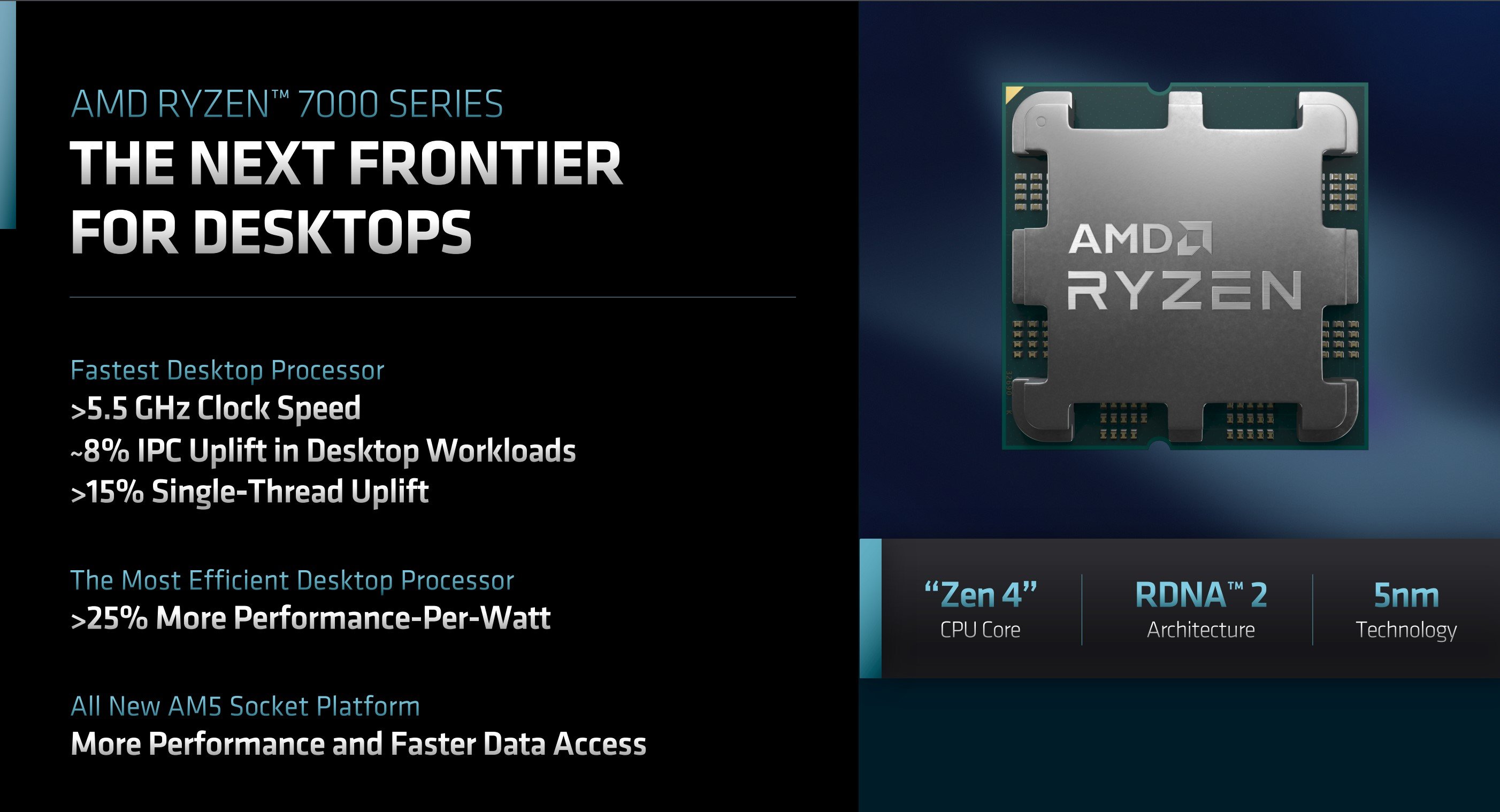
Why the new AMD Ryzen 7000 processors for the AM5 socket are currently not a good deal
Posted by Stefan on 2022-10-11
At the end of September 2022, the time had come: AMD presented its latest desktop processors called AMD Ryzen 7000. Initially, 4 processors with 6 to 16 CPU cores were released.
The new socket AM5 (LGA 1718) is used for the first time, which is intended to replace the very durable socket AM4 introduced in 2017 as AMDs mainstream platform. This includes (depending on the chipset) PCIe 5.0 support as well as the exclusive use of DDR5 memory on all AM5 mainboards.
Officially, DDR5-5200 is the maximum, but with AMDs EXPO Technology which is similar to Intel's XMP 3.0, AMD now also has a solution for easy overclocking of the main memory. AMD itself names DDR5-6000 as the sweet spot for the new AMD Ryzen 7000 processors.
The new socket AM5 (LGA 1718) is used for the first time, which is intended to replace the very durable socket AM4 introduced in 2017 as AMDs mainstream platform. This includes (depending on the chipset) PCIe 5.0 support as well as the exclusive use of DDR5 memory on all AM5 mainboards.
Officially, DDR5-5200 is the maximum, but with AMDs EXPO Technology which is similar to Intel's XMP 3.0, AMD now also has a solution for easy overclocking of the main memory. AMD itself names DDR5-6000 as the sweet spot for the new AMD Ryzen 7000 processors.
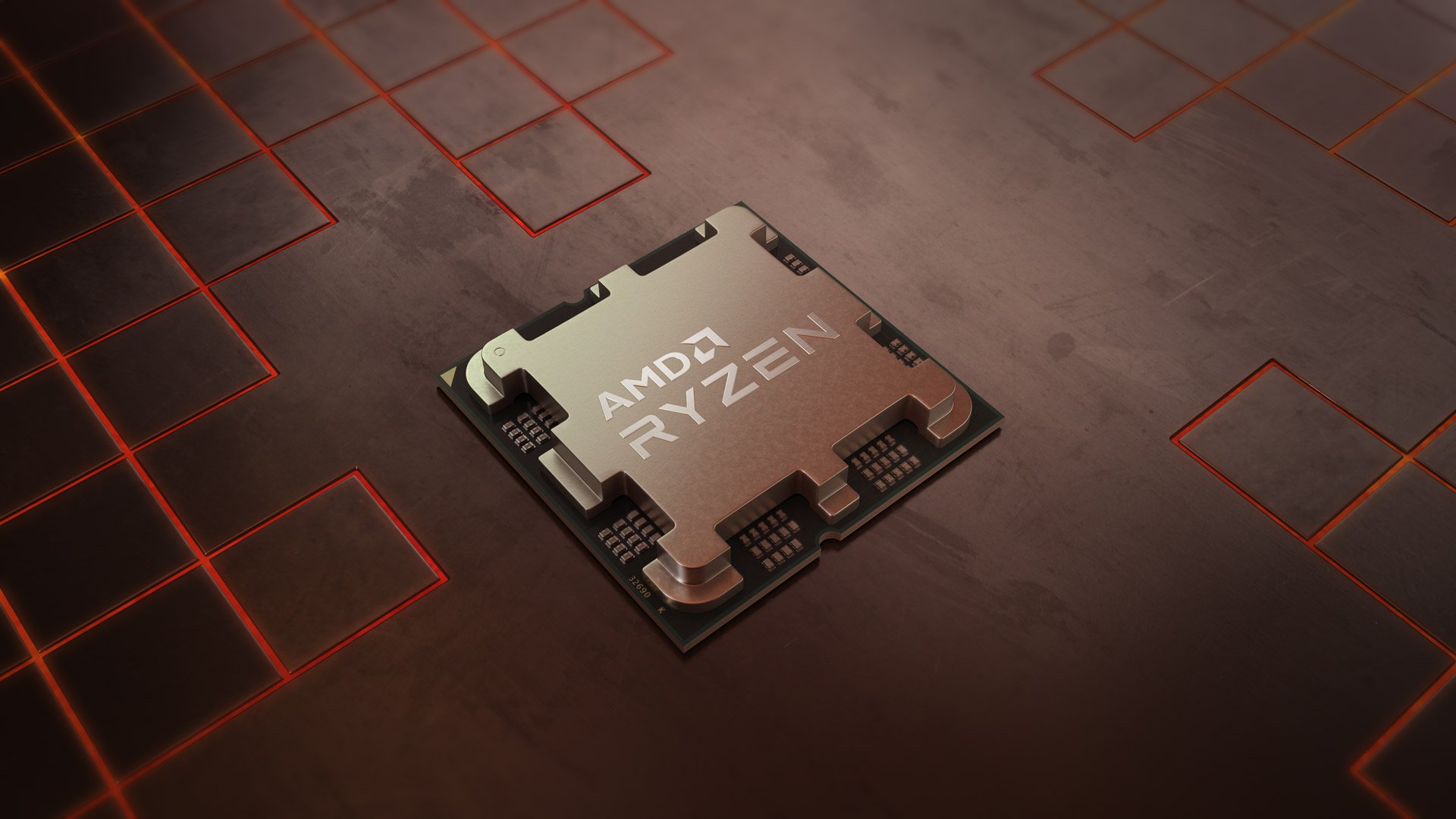
The evolution of AMD Ryzen processors
Posted by Stefan on 2022-09-06
The AMD Ryzen processors are designed for the mid to high-end range and are grouped into the Ryzen 3, Ryzen 5, Ryzen 7 and Ryzen 9 classes. AMD follows the market leader Intel, which groups its Core i series (Intel Core i3, Core i5, Core i7 and Core i9) identically.
The AMD Ryzen processors were first introduced by AMD in Q1 2017. They are the successor to the not particularly successful AMD Bulldozer processors. The latter were manufactured using an outdated manufacturing process and could not keep up with the competing products from Intel. AMD lost a large portion of its desktop processor market share during this period.
The AMD Ryzen processors were first introduced by AMD in Q1 2017. They are the successor to the not particularly successful AMD Bulldozer processors. The latter were manufactured using an outdated manufacturing process and could not keep up with the competing products from Intel. AMD lost a large portion of its desktop processor market share during this period.
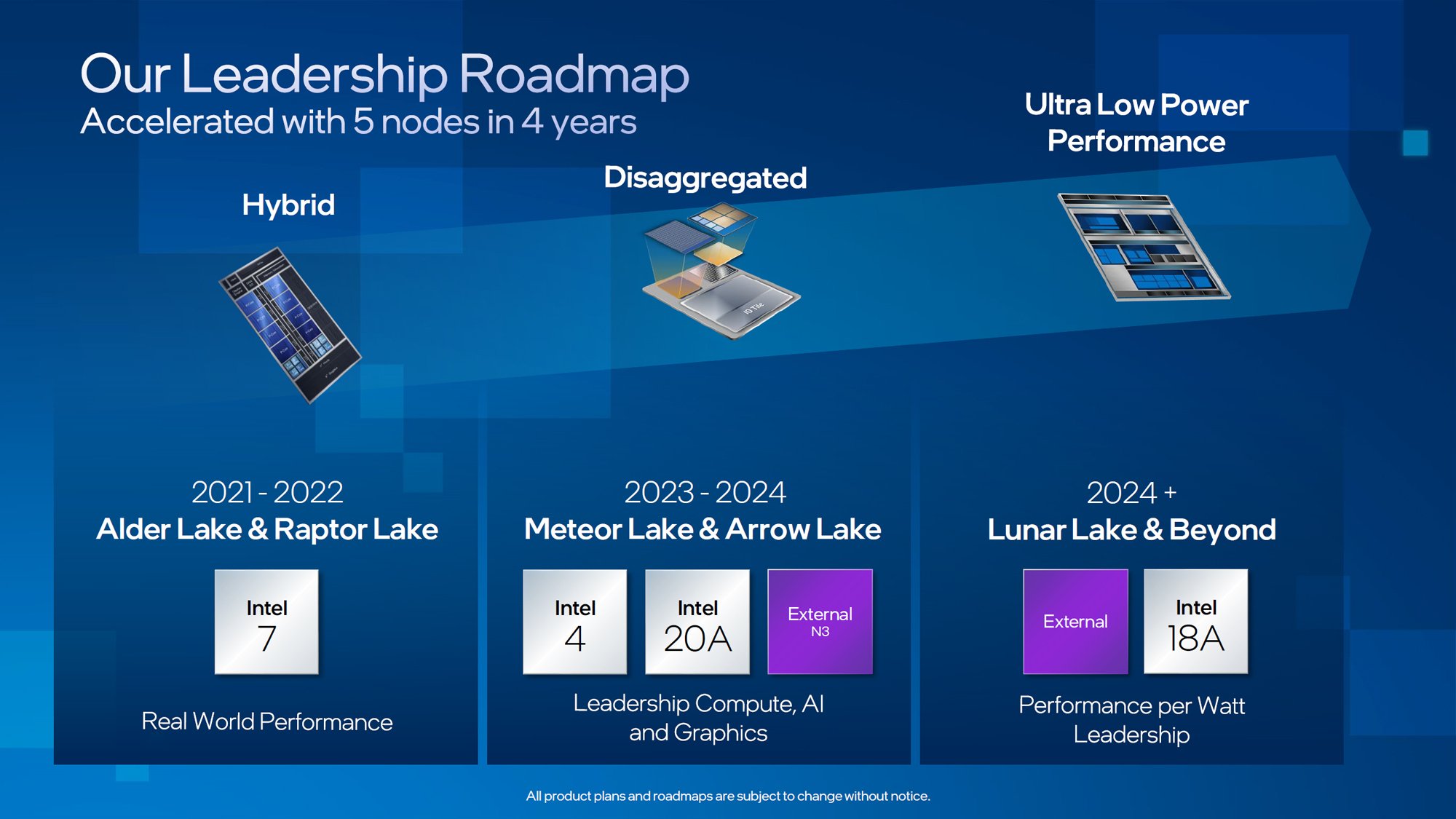
AMD Ryzen 7000 and Intel Core i 13 Gen at almost 6 GHz clock speed
Posted by Stefan on 2022-08-29
In September, both AMD and Intel are introducing their new mainstream desktop processors. It doesn't seem to have been as close as this year for a long time, leaked benchmarks of the new top models from AMD and Intel point to a head-to-head race.
This year even the 6 GHz clock limit is almost within reach. With a good cooler and some overclocking it should be possible to reach the 6 GHz limit. But even in series production, the manufacturers try to realize the highest possible clock frequency, at least on one core.
This year even the 6 GHz clock limit is almost within reach. With a good cooler and some overclocking it should be possible to reach the 6 GHz limit. But even in series production, the manufacturers try to realize the highest possible clock frequency, at least on one core.
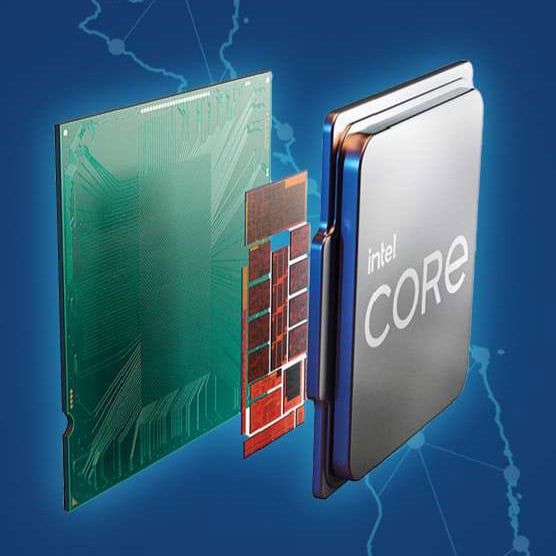
Intel Core i7-13700K could debut with 16 cores and 24 threads
Posted by Stefan on 2022-07-20
According to an internal Intel slide published at the end of last year, the Intel Core i7-13700K could have 8+8, i.e. 16 CPU cores that provide 24 threads. The interesting thing about the slide is that it was recently confirmed by newer leaks of the Intel Core i9-13900K and the Intel Core i5-13600K as the number of cores and also the size of the cache matches with recently published CPU-Z screenshots of alleged development models.
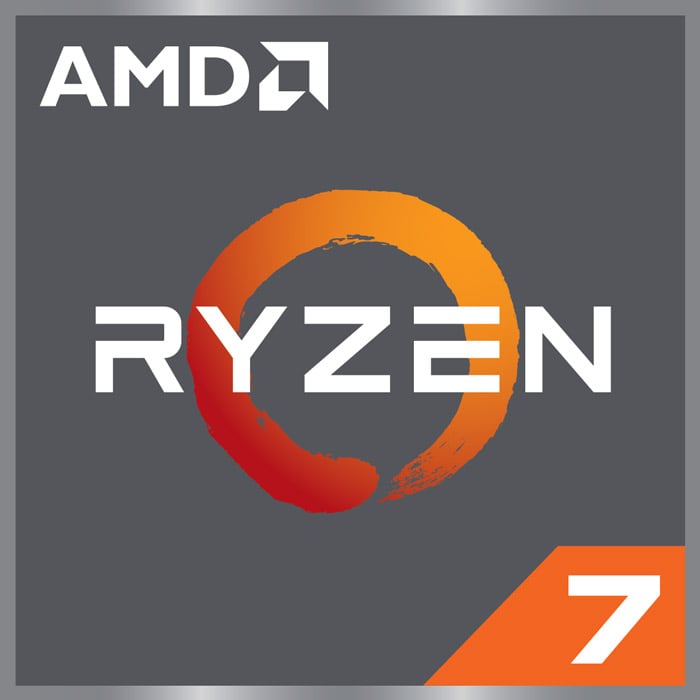
AMD Ryzen 5 7600X and AMD Ryzen 7 7800X are coming in September
Posted by Stefan on 2022-06-20
After we published a performance assessment of the AMD Ryzen 9 7950X last week, the well-known AMD leaker Greymon55 has now posted more informations via Twitter.
He predicts the first four models of the new Zen 4 desktop generation, which AMD would like to present at the end of 2022. There is also an alleged release date of September 15, 2022.
He predicts the first four models of the new Zen 4 desktop generation, which AMD would like to present at the end of 2022. There is also an alleged release date of September 15, 2022.
Comparison of the two processors
In a comparison between the Intel Core i9-13900K and the AMD Ryzen 9 7950X, the current top models from the two manufacturers compete against each other. The technical implementation of the two processors could hardly be any different.The Intel Core i9-13900K relies on a hybrid big.LITTLE CPU core structure consisting of 8 fast P cores (performance, Raptor Cove) and 16 smaller and more efficient E cores (efficiency, Gracemont). The P-cores have a base clock of 3.0 GHz and can reach up to 5.8 GHz in turbo mode. These cores are based on Intel's older CPU cores of the Intel Core i generations.
The smaller E cores are based on Intel's Atom technology and clock at 2.2 GHz. These smaller CPU cores also have a turbo mode in which a clock frequency of up to 4.3 GHz can be achieved. Although the smaller CPU cores are slower than the faster P cores, they require significantly less energy. The E cores can take care of background tasks to save energy or calculate tasks together with the faster P cores.
In total, the Intel Core i9-13900K has 24 CPU cores that can process up to 32 threads simultaneously.
The AMD Ryzen 9 7950X relies on 16 equally sized CPU cores that clock at 4.5 GHz in the base. The AMD processor also has a turbo mode and can reach up to 5.7 GHz as long as the power consumption and CPU temperature are within a specified range.
The classic CPU core structure of the AMD Ryzen 9 7950X seems increasingly outdated, as it does not act as dynamically and flexibly as a hybrid core structure and, for example, requires significantly more energy than a hybrid solution when idling or with low CPU loads. It is expected that AMD will follow the competition with the 8000 generation (Zen 5) and also offer CPUs with a hybrid core structure.
Popular comparisons containing this CPUs
back to index









